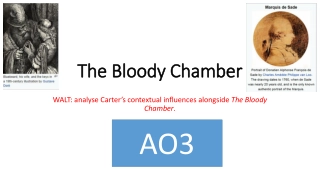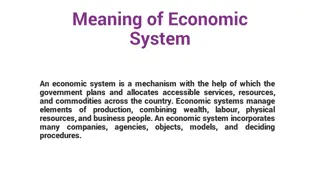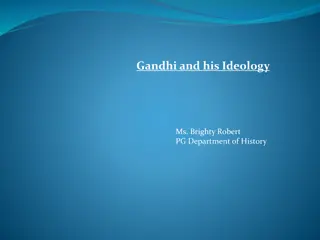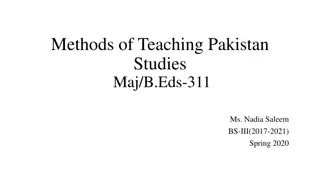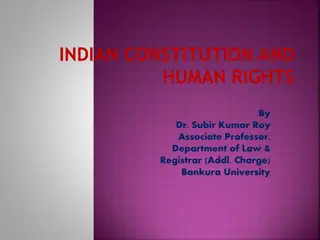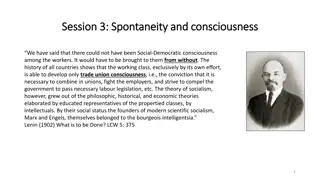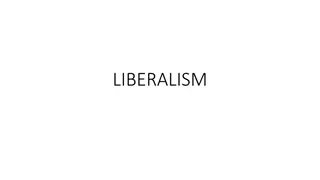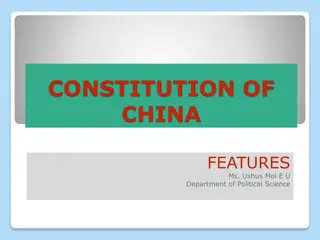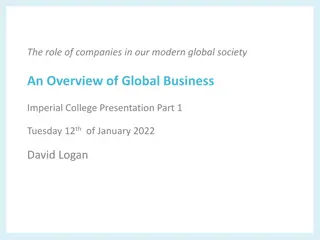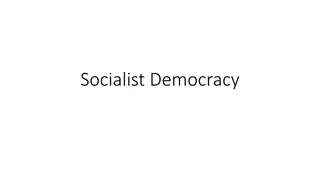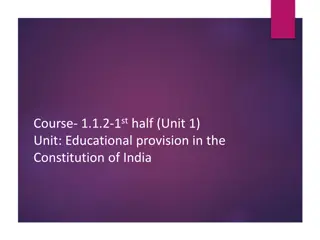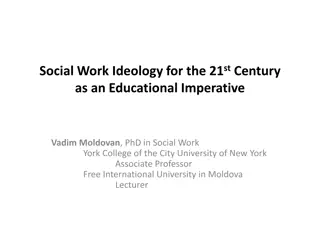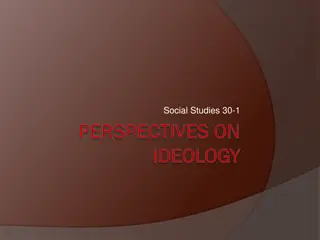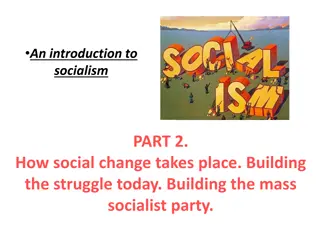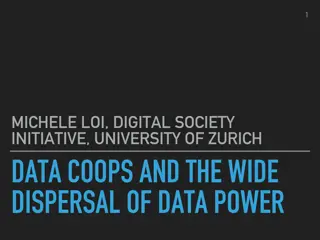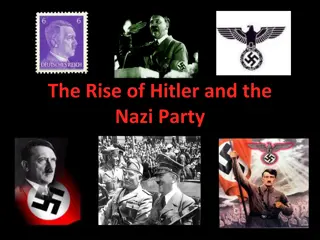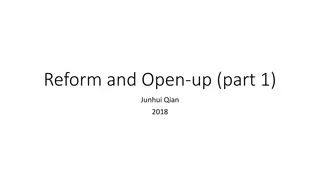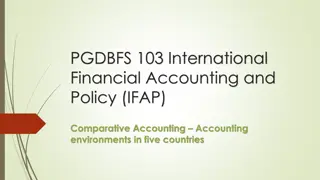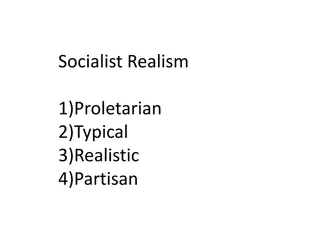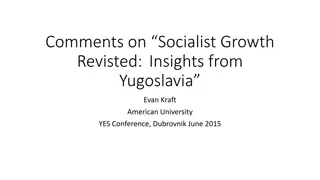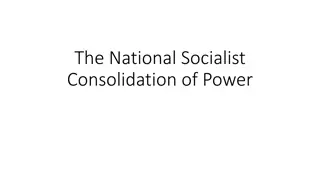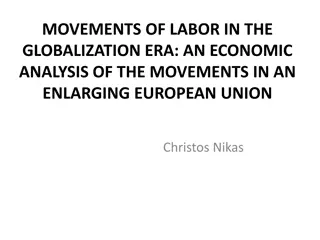Knowledge and Curriculum
Various forms of curriculum, the importance of curriculum, new trends in education, and the relationship between power and ideology in curriculum development. Understand the role of the state in curriculum development and the impact of meritocracy on the curriculum.
2 views • 16 slides
Angela Carter and Her Influential Works: A Contextual Analysis
Angela Carter, an English novelist known for her feminist and magical realism works, was influenced by her personal experiences and feminist ideologies. Her notable works include "The Bloody Chamber" and "The Sadeian Woman and the Ideology of Pornography". Carter's unique perspective on women's role
1 views • 26 slides
The Significance of Media in Language Learning
Media plays a crucial role in language learning by raising awareness of the ideology behind linguistic structures and providing valuable information on society and culture. Linguists are drawn to media language for research purposes and to understand its impact on language use and attitudes. Media s
12 views • 5 slides
Understanding Economic Systems and Sectors
An economic system is a mechanism through which the government plans and allocates resources and services. Types include capitalist, socialist, and mixed economies, each with distinct characteristics. The central problem of the economy is managing scarcity. The economic sector comprises the primary,
2 views • 5 slides
Exploring Responsibility and Social Change in 'Young and Old' Play
In the play "Young and Old," the characters Eric, Sheila, and Gerald represent the younger generation, while Arthur and Sybil symbolize the older generation. The story delves into the concept of responsibility, highlighting the different attitudes towards Eva's death. Arthur and Sybil, despite being
0 views • 9 slides
Mahatma Gandhi and His Ideology in Indian History
Mahatma Gandhi, a pivotal figure in India's freedom struggle, advocated for non-violence, truth, and self-realization. He reshaped the Indian National Congress and empowered the masses to fight against injustice through civil disobedience. Gandhi's ideologies of swadeshi, local democracy, and truste
0 views • 28 slides
Objectives and Aims of Teaching Pakistan Studies in Education
Understanding the objectives and aims of teaching Pakistan Studies is essential for educators. Objectives serve as guiding points in the teaching-learning process, providing a framework for evaluation and development. On the other hand, aims are broader and philosophical, focusing on the purpose and
0 views • 48 slides
Understanding Religious Conflict: Definition and Types Explored
Religious conflict is a complex and recurring concept throughout history. Scholars have defined it as disagreements between religious groups. This conflict arises from contentious issues touching on ideology, morality, power, and identity, influenced by various socio-political, economic, and cultura
1 views • 13 slides
George Bernard Shaw: Influential Playwright and Social Critic
George Bernard Shaw, an Irish playwright, social critic, and political activist, is renowned for his witty language and social criticism in works like "Arms and the Man," "Pygmalion," and "Saint Joan." Shaw's influence on British socialist theory through Fabianism and his embodiment of realism in En
0 views • 25 slides
Indian Constitution and Human Rights: A Comprehensive Overview
The Indian constitution embodies justice in social, economic, and political spheres, aiming for the full development of every individual. Rooted in democratic principles and socialism, the preamble emphasizes liberty, equality, and justice. Drawing wisdom from leaders like Dr. Ambedkar and Mahatma G
0 views • 10 slides
The Role of Consciousness in Social-Democratic Thought
The development of socialist consciousness among the working class is discussed, emphasizing the need for outside influence to foster class and political awareness. Key figures such as Lenin and Kautsky are cited in their exploration of how consciousness is acquired and its significance in the labor
0 views • 6 slides
Contextual Evolution in J.B. Priestley's Play: An Inspector Calls
J.B. Priestley's play "An Inspector Calls" was set in 1912 but written in 1945, reflecting the significant changes in society between these years. Explore the context and events that influenced Priestley's work, showcasing his socialist views and the impact of historical events like WWI and WWII on
0 views • 12 slides
Understanding Class Struggle in Animal Farm through Marxist Ideology
Animal Farm, written by George Orwell, explores the concept of class struggle through the lens of Marxist ideology. The novel depicts the conflict between the bourgeoisie, represented by characters like Mr. Jones, and the proletariat, symbolized by the other animals on the farm. Through the story of
0 views • 12 slides
Understanding Liberalism: Key Ideas and Historical Context
Liberalism, a prominent political ideology, emerged in the 19th century and is closely linked to capitalism. It stands against absolutism and feudal privileges, advocating for individualism, freedom, reason, equality, toleration, consent, and constitutionalism. The evolution of liberalism emphasized
1 views • 18 slides
Features of China's 1982 Constitution
The 1982 Constitution of China, drafted after extensive discussions, adheres to socialist principles and emphasizes the socialist system as the foundation of the state. With a total of 138 Articles, it is a flexible document allowing for easy amendments and maintains a unitary system with centralize
2 views • 13 slides
Evolution of Companies and Global Business Impact
The presentation delves into the historical evolution of companies, from ancient multi-nationals to modern global corporations. It explores the intertwined relationships between economic expansion, colonialism, capitalism, and socialist movements. The presentation also discusses the role of companie
0 views • 20 slides
Understanding Socialist Democracy: A Political Ideology Explained
Socialist democracy is a political idea that combines elements of democracy and socialism, rejecting capitalism and authoritarian socialism. Proponents advocate for democratic decision-making and public ownership of the means of production. They believe in economic equality, government regulation of
2 views • 13 slides
Directive Principles of State Policy in the Indian Constitution
The Directive Principles of State Policy in the Indian Constitution provide guidelines for governance, focusing on social justice, economic welfare, and a just society. These principles are inspired by socialist ideology and aim at ensuring social and economic justice by minimizing inequalities, pro
3 views • 16 slides
Social Work Ideology for the 21st Century: Educational Imperative
Social work education must adapt to current global challenges by reexamining ethical principles in light of perpetual warfare, fake news, and economic globalization. This paper discusses the relevance of social values in a changing world and proposes pedagogies for promoting a modern social work ide
0 views • 14 slides
Evolution of Parental Leave Policies in Bulgaria: A Historical Overview
Explore the transformation of parental leave policies in Bulgaria from the socialist era to the modern EU influence. The seminar delves into the progression of rights and entitlements for parents, inclusive of various family structures and dynamic societal needs. Key topics include paid parental lea
0 views • 18 slides
Role of Money in a Socialist Economy
Money in a socialist economy serves various essential functions such as a measure of value, medium of circulation, means of payment, accumulation, and distribution, along with providing monetary incentives and freedom of choice to individuals. It plays a crucial role in evaluating economic activity
0 views • 5 slides
Understanding Ideology and Society: Perspectives and Beliefs
Explore the significance of ideology in shaping societal perspectives, beliefs, and values. Understand the impact of ideologies on laws, societal structures, and individual behavior. Delve into concepts such as liberalism, individualism, and collectivism to gain insights into human societies through
4 views • 26 slides
Understanding Critical Theory in International Relations: A Deep Dive
Critical theory in IR since the mid-1980s challenges traditional views by emphasizing culture, ideology, and societal structures over objective truths. This approach questions the relationship between theory and practice, highlighting issues of inequality beyond just class, including race, ethnicity
0 views • 9 slides
Understanding Popular Culture and Ideology
Popular culture encompasses the lived practices and artistic products of society, contrasting with high culture. Various definitions highlight its appeal to a wide audience and its distinction from high culture. The relationship between popular culture and ideology is explored through practices that
0 views • 15 slides
Building Socialism: Strategies for Social Change and Political Action
Explore the process of social change towards socialism through mass action, organization, and the building of a socialist party. Emphasizing the importance of campaigns, reforms, and transitional methods, the journey involves uniting the working class, challenging the capitalist system, and particip
4 views • 10 slides
Data Coops and Power Dispersal in Digital Society
Michele Loi from the Digital Society Initiative at the University of Zurich discusses the concept of data cooperatives and their role in distributing data power. These cooperative structures allow for democratic control over data management, emphasizing individual ownership and shared asset utilizat
0 views • 19 slides
Insights into Animal Farm: A Narrative of Betrayal and Manipulation
The narrative of Animal Farm encapsulates the evolution from an idealistic society to a manipulative regime, illustrating themes of betrayal, rule violations, manipulation, leadership exaggeration, harsh penalties, rumor spreading, forced labor, and emotional suppression within a communist-socialist
0 views • 10 slides
Analysis of Ideology in Thomas Pynchon's "The Crying of Lot 49
This analysis delves into the story and ideology in Thomas Pynchon's novel "The Crying of Lot 49". The plot follows Oedipa Maas as she investigates the mystery of Tristero, a secret postal service. Set in California during the 1960s, the novel reflects the societal context of America during the Cold
0 views • 15 slides
Changing Trends in Cuban-American Voter Ideology
Explore the evolving political ideology of Cuban-American voters from 1991 to 2011 through data on migration, residency, naturalization, and political exceptionalism. Uncover how these trends have influenced Miami's Latino demographics and the Cuban perspective on US/Cuba relations.
0 views • 24 slides
The Rise of Adolf Hitler and the Nazi Party: A Historical Overview
Adolf Hitler, born in Austria in 1889, faced rejection as a painter before turning to politics. He led the National Socialist German Workers Party (Nazi) and orchestrated the failed Beer Hall Putsch in 1923. Imprisoned briefly, he penned Mein Kampf that propagated Nazi ideology. By 1932, the Nazi Pa
0 views • 15 slides
Rise of Mussolini in Italy and Weaknesses of the Liberal Monarchy
The historical timeline of Italy before 1919 led to Mussolini's rise to power through various events such as his involvement with the Italian Socialist Party and the formation of the Fascio di Combattimento. Italy's Liberal Monarchy faced weaknesses, including political divisions between progressive
0 views • 35 slides
Election of 1912 and Its Impact on APUSH Students
Explore the dynamic Election of 1912 in US history, featuring William Howard Taft, Theodore Roosevelt, Woodrow Wilson, and Eugene Debs. Learn about the split in the Republican Party, Wilson's victory, Debs' Socialist impact, and the rise of the Progressive Party. Subscribe for more educational conte
0 views • 5 slides
Rental Sector Trends and Policy Evolution in Slovenia and Serbia
Explore the evolution of the rental sector in Slovenia and Serbia, from the socialist order to privatization and the current challenges faced in providing social housing. Key events, documents, and legislative acts have shaped the rental landscape in these transition countries, impacting ownership r
0 views • 16 slides
Rental Tenures in Slovenia: Insights from Post-Socialist Countries
Slovenia exhibits a unique tenure structure with a high percentage of home ownership and specific regulations governing rental tenures. The 2003 Housing Act defines various rental types, including non-profit and market-based rentals, while legislation outlines rules on contracts, rent regulation, an
0 views • 13 slides
Reform and Open-up: The Evolution of Chinese Rural Economy
This article delves into the historical background and key events that shaped the reform and open-up policies in China, focusing on the transformation of the countryside, the rise of Township and Village Enterprises (TVEs), and the implementation of the Household Responsibility System (HRS). It disc
0 views • 28 slides
Accounting Environment in Peoples Republic of China (PRC)
The accounting environment in Peoples Republic of China (PRC) has undergone significant changes from a planned economy to a socialist market economy. With the emergence of private enterprises and foreign investments, the accounting profession has evolved as well. Guanxi, the concept of networks and
0 views • 22 slides
Soviet Socialist Realism: Artistic Representation of Revolutionary Development
Socialist Realism emerged as the fundamental method of Soviet literature and art, emphasizing truthful and historically concrete depictions of reality within a revolutionary context. It required artists to engage in ideological transformation and educate the masses in the spirit of socialism. This a
0 views • 21 slides
Insights from Yugoslavian Economic Growth Model Analysis
This paper revisits socialist growth in Yugoslavia, focusing on model-based assessment of economic determinants and findings related to Total Factor Productivity (TFP) growth. The model decomposes output growth deviations, discussing factors like efficiency wedge, labor wedge, investment wedge, and
0 views • 12 slides
The National Socialist Consolidation of Power - Legal Revolution in the Reichstag
Hitler's consolidation of power in Germany involved strategic maneuvers such as exploiting the Reichstag fire to pass emergency decrees, suspending civil liberties, and ultimately passing the Enabling Act, granting him dictatorial powers. These actions allowed Hitler to establish a totalitarian regi
0 views • 23 slides
Analysis of Labor Movements in the Globalization Era
Contemporary labor movements in the era of globalization differ from previous periods, influenced by factors such as globalization, European integration, the collapse of the socialist system, and economic disparities. The dynamics of migration have evolved, impacting various countries and regions. T
0 views • 29 slides

